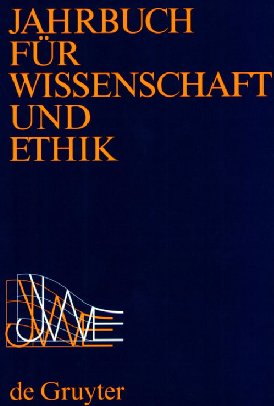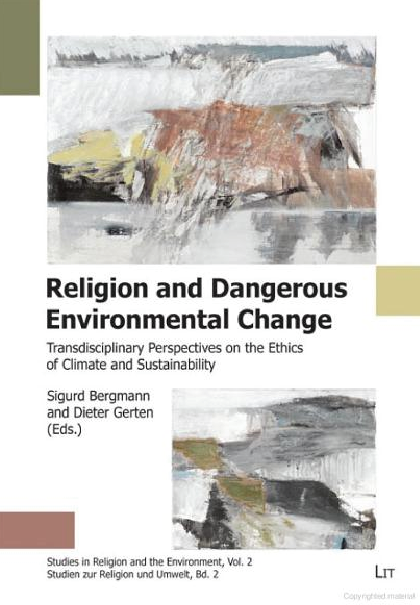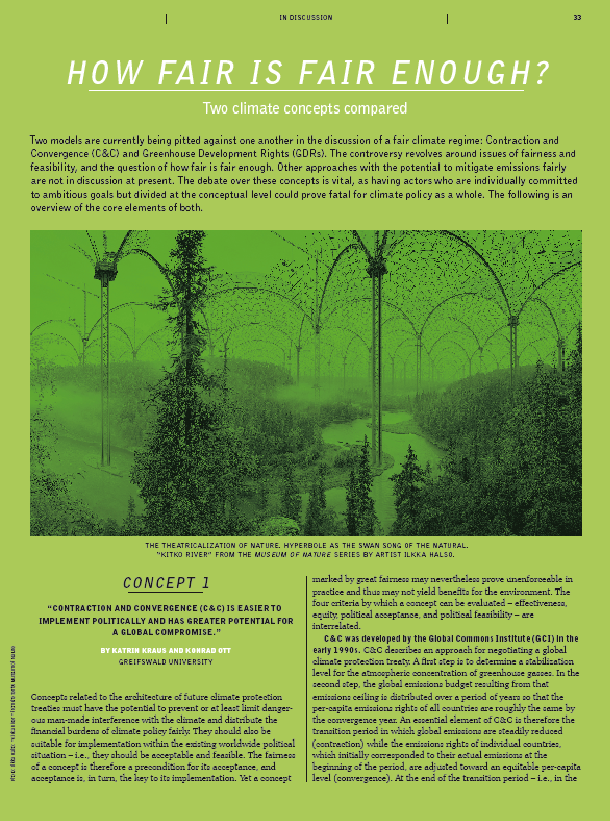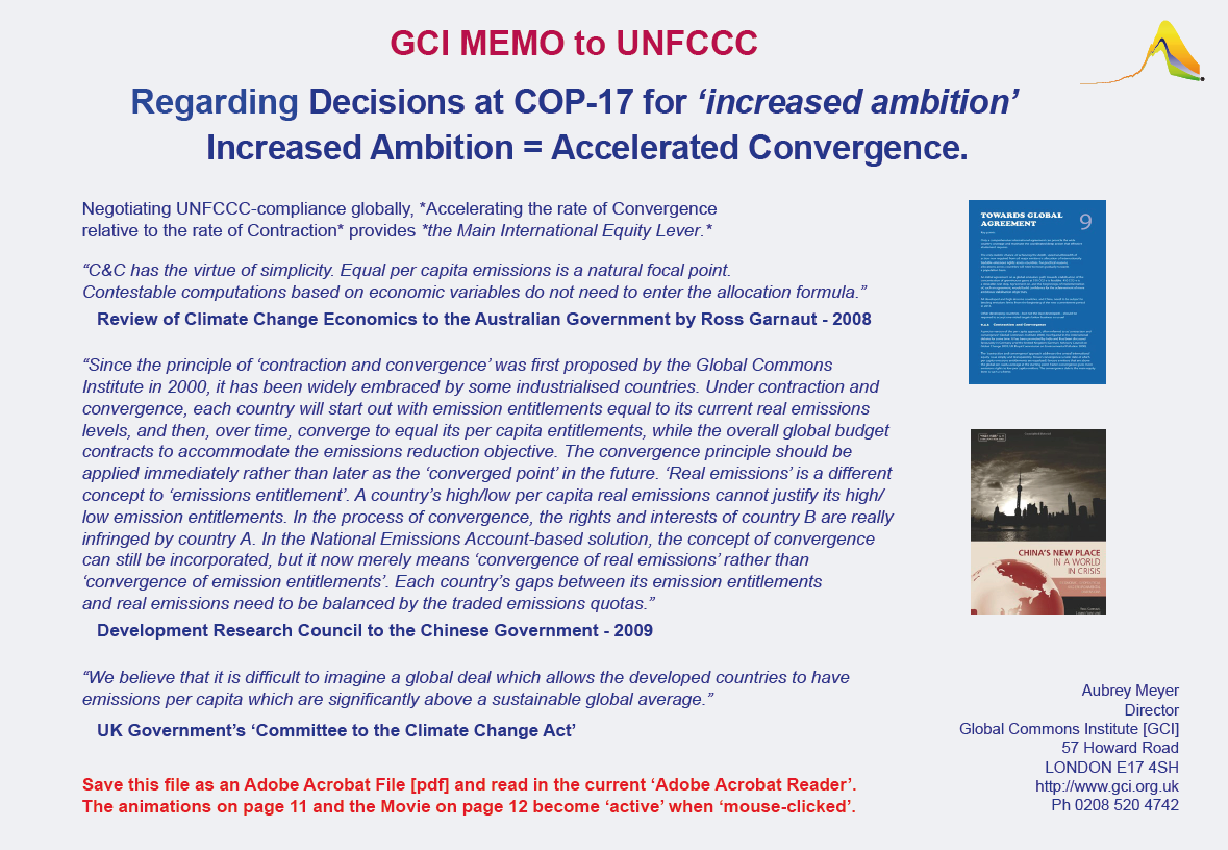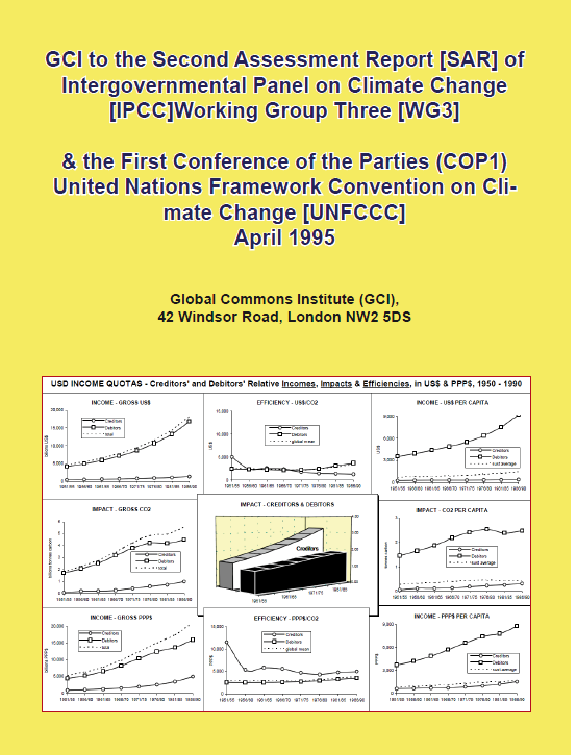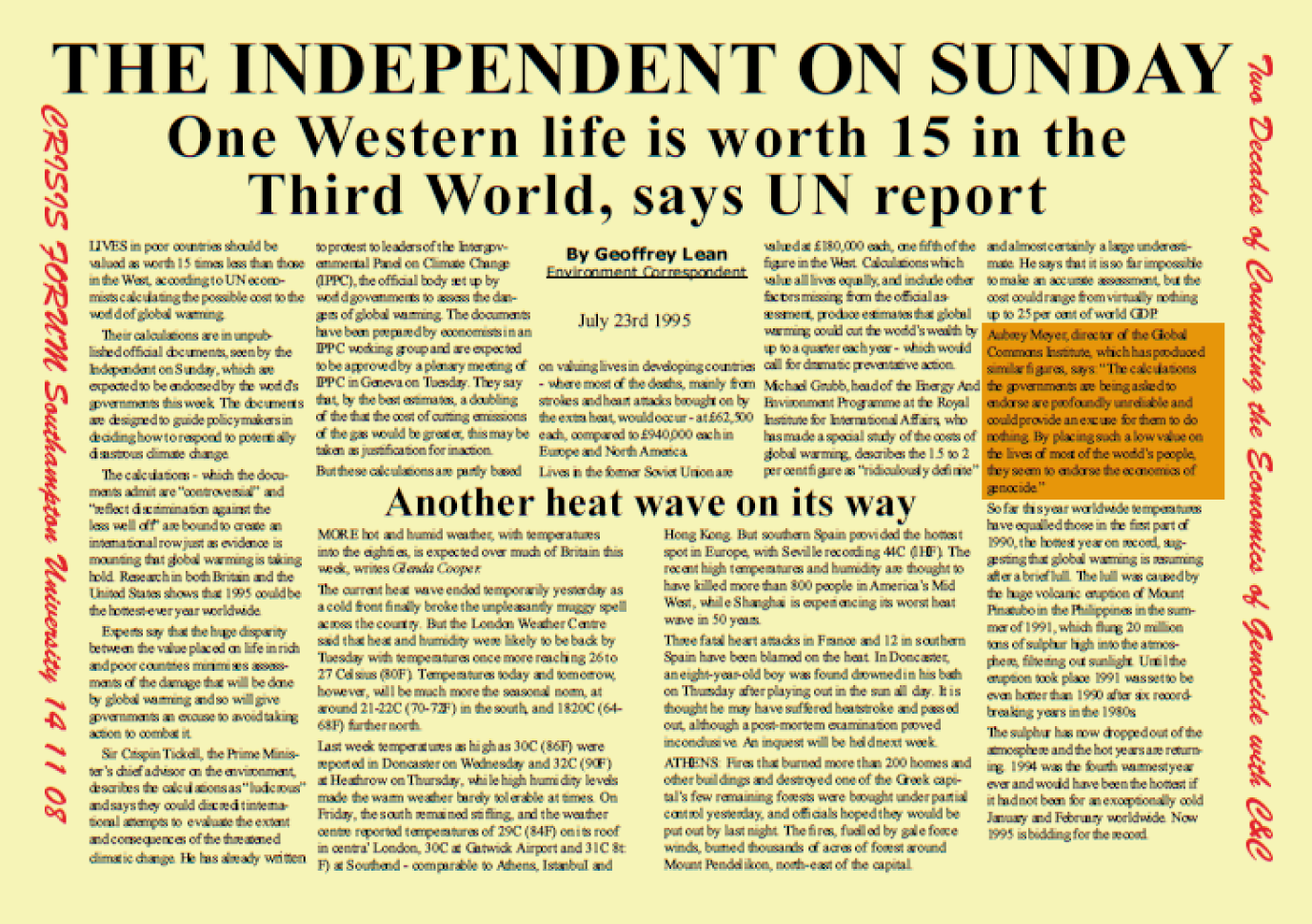Dear Aubrey
I support the C&C proposal!
Best
Konrad
Professor Konrad Ott
University of Griefswald
He has a recent article "Domains of Climate Ethics" in the "Yearbook of Science and Ethics" ["Jahrbuch für Wissenschaft und Ethik", Vol. 16.]
The attractiveness of GDR has faded at a closer look. In terms of political feasibility, C&C has clear advantages because some high-rank politicians, like Angela Merkel, have verbally agreed upon the C&C idea. For Northern countries, the economic impacts of C&C are severe but viable under a prudent long-term transition management while the distribution effects of GDR might be beyond control. The North clearly is not bankrupt after the financial crisis of 2009 but the effects of a GDR regime on employment, on domestic social security systems, and on taxation schemes have not been assessed yet. Even from an ethical perspective GDR must be seen with a critical lens because it combines an emergency ethics that allows for uncommon measures with a highly conventional approach to development as being defined in terms of monetary income. GDR seems to place the right to create monetary income at the centre of the system of human rights. If so, there are reasons to claim that a C&C-concept that must be enlarged to the domain of adaptation and might adopt some important points from GDR is, all things considered, the ‘better’ concept.
Domains of Climate Ethics; Konrad Ott
Jahrbuch fur Wissenschaft und Ethik~~~~~~~~~~~~~~~~~~~~~~~~~~~~
In 48 points or “better steps”, German philosopher and envrionmental ethicist Konrad Ott continues "Kronolid’s struggle with the ethical implications of climate change by elaborating basic foundations on existing and necessary policies for climate change. The short sections are consistently formulated as “ethical claims” and the reader should approach these slowly and with concentration, so that the subsequent steps are converted into one single walk and path.At the core of the author’s argument lies the climate-ethics concept of “Contraction and Convergence”. This argument provokes a constructive debate, and it presumes to to support a concept that has been regarded as “Utopian a decade ago but has now entered the political stage. What might it contribute to international climate policy in a nondistant future?
Religion and Dangerous Environmental Change
Sigurd Bergmann Dieter Gerten [Eds]Contraction & Convergence and Greenhouse Development Rights:
A Critical Comparison Between Two Salient Climate-Ethical Concepts
"All in all C&C is the preferable concept."
Two models are currently being pitted against one another in the discussion of a fair climate regime: Contraction and Convergence (C&C) and Greenhouse Development Rights (GDR s). The controversy revolves around issues of fairness and feasibility, and the question of how fair is fair enough. Other approaches with the potential to mitigate emissions fairly are not in discussion at present. The debate over these concepts is vital, as having actors who are individually committed to ambitious goals but divided at the conceptual level could prove fatal for climate policy as a whole. The following is an overview in the magazine of the Heirich Boell Foundations of the core elements of both with Katrin Krause and Konrad Ott for C&C and Tilman Santarius for GDRs.
How Fair is fair Enough?Dear Konrad
Thank you so much for writing and for sharing the article in "Jahrbuch für Wissenschaft und Ethik", Vol. 16.
I think it is very useful and I certainly hope it will be.I do agree with your point: -
"It would be deplorable if members of the political camp that supports most principles, objectives, and strategies outlined in the previous sections of this article might split into supporters of two competing ethical concepts, Contraction and Convergence (C&C) 59 and Greenhouse Development Rights (GDR) 60."
It would be deplorable if we did that. [Sadly it already is]. The moral point that GDR's seeks to emphasize [the enormity of the 'climate-debt' and the 'climate-cisis'] is justified and this twin problem continues as the economics of 'Expansion and Divergence' still informs the policy debate. After 23 years I can say that resolving this twin-problem has proved to be really daunting, as a form of reciprocal blackmail still seems to inform the negotiations.
GDR advocacy has been making the case that C&C has under-recognized this twin problem. I think this is error. In my view, doing this has been at the expense of what the politicians and the diplomats at the UNFCCC can realistically do to make arrangements for UNFCCC-compliance.
From the outset C&C sought not to continue a culture of adversarial engagement but to connect with the unifying logic that necessarily governs the collective efforts to become UNFCCC-compliant. In practice, GDR seems to deepen that adversarial tendency and so decrease prospects for detente.
On this matter I think a way forward is: -
[a] to see C&C as the basic organizing structure and then - on that basis - as you suggest, to welcome
[b] any additional 'compensatory' arrangements that can be agreed
[c] to see [b] as ineffective without [a].This is what I have sought to project to UNFCCC in the memo requested at COP-17 for 'increased ambition': -
Regarding Decisions at COP-17 for ‘increased ambition’ equals 'accelerated convergence'. Negotiating UNFCCC-compliance globally, *Accelerating the rate of Convergence relative to the rate of Contraction* provides *the Main International Equity Lever.*“C&C has the virtue of simplicity. Equal per capita emissions is a natural focal point. Contestable computations based on economic variables do not need to enter the allocation formula.”
Review of Climate Change Economics to the Australian Government by Ross Garnaut - 2008
“Since the principle of ‘contraction and convergence’ was first proposed by the Global Commons Institute in 2000, it has been widely embraced by some industrialised countries. Under contraction and convergence, each country will start out with emission entitlements equal to its current real emissions levels, and then, over time, converge to equal its per capita entitlements, while the overall global budget contracts to accommodate the emissions reduction objective. The convergence principle should be applied immediately rather than later as the ‘converged point’ in the future. ‘Real emissions’ is a different concept to ‘emissions entitlement’. A country’s high/low per capita real emissions cannot justify its high/low emission entitlements. In the process of convergence, the rights and interests of country B are really infringed by country A. In the National Emissions Account-based solution, the concept of convergence can still be incorporated, but it now merely means ‘convergence of real emissions’ rather than ‘convergence of emission entitlements’. Each country’s gaps between its emission entitlements and real emissions need to be balanced by the traded emissions quotas.”
Development Research Council to the Chinese Government - 2009
“We believe that it is difficult to imagine a global deal which allows the developed countries to have emissions per capita which are significantly above a sustainable global average.”
UK Government’s ‘Committee to the Climate Change Act’
GCI MEMO to UNFCCCAfter all this time, my hopes are lower these days, but it is obviously still worth the effort of trying to get detente.
With thanks once again for all that you do and with kind regards
Aubrey
~~~~~~~~~~~~~~~~~
It became apparent to me early [during the 1990's] that: -
- the 'gaps' and 'cross-purposes' emerging in the policy-debate for UNFCCC-compliance were vast and various
- these emerged from the different 'cultures of argument' both within and between the disciplines that were responding
- any positions put forward where the monetary unit was the dominant numeraire tended to make this more & not less opaque
There was a vivid run-in with 'Global Cost/Benefit-Analysis' of climate change [economists Nordhaus/Pearce etc] over the 'value of life' in the preparation for IPCC SAR. Unequal life evaluation in the mortality costs was presented by them and it was rejected [see below].
So C&C was quite deliberately based on: -
- the numeraire carbon-per-person-per-unit-time, subject to the objective of the UNFCCC
- subordinating the monetary-unit to that.
GCI Evidence to the IPCC Second Assessment [SAR 1995]
'The Economics of Genocide' in SAR's Global Cost/Benefit Analysis of Climate Change.
[Supplementary here: - MON_ECO].
The result was SAR 'Policy Makers Summary': -"Literature on the subject in this section is controversial and mainly based on research done on developed countries, often extrapolated to developing countries. There is no consensus about how to value statistical lives or how to aggregate statistical lives across countries. Monetary valuation should not obscure the human consequences of anthropogenic climate change damages, because the value of life has meaning beyond monetary value."
GCI Tracking climate-change's 'Economics of Genocide' 1993-2008
ending with and interview at COP-9 Poznan with Nicholas Stern on his surprisingly extreme views.~~~~~~~~~~~~~~~~~~~~~~~~~~
Back to UNFCCC Submission Back to Signatory List



